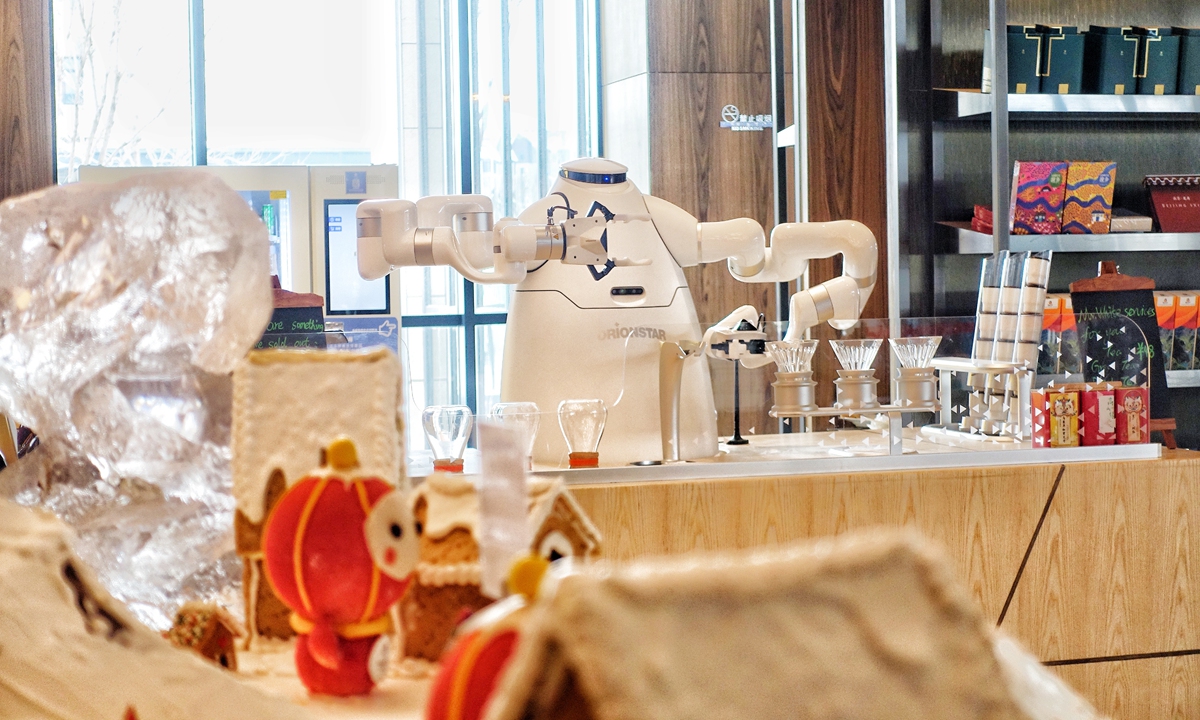
A service robot"Coffee Master"is brewing tea for visitors. Photo: Courtesy of ORION STAR
"Please wear the mask before entering the hall," a security inspection robot named 'Andi' reminds visitors while making its rounds outdoors. Meanwhile, a service robot named "Coffee Master" is brewing tea and coffee for visitors in the main hall. "Coffee is ready, please enjoy it now!" Once prepared, a delivery robot named "Lucki" will bring the freshly prepared drinks to visitors.
This is a real-life scene which took place at Olympic-contracted hotels during the Beijing 2022 Winter Olympic Games. Thanks to the government support to promote industrial robotics, the sector is greeting unprecedented opportunities.
Following its Olympics success, the outstanding performance of Chinese-made robots at the global sports gala have attracted customers across the world, representing the country's innovation ability while boosting Chinese people's pride.
With the rapid development of China's robotics industry, the new technology will increasingly appear throughout people's lives, analysts said.
Amazing servicesSince 2019, Beijing has held a number of evaluation contests on service robot innovations for the 2022 Winter Olympics, and 84 robots made by 47 companies covering nine scenarios including hotel check-in, food delivery, translation and security inspection participated in the selection.
During the Winter Games, Chinese robots provided high-tech services for the athletes, contributing to the pandemic control and prevention, as well as ensuring the smooth operation of the events.
At the hotels in the competition area located in Yanqing District, Beijing, a smart robot "Coffee Master" with skilled tea brewing techniques from ORION STAR, a Chinese private tech firm, became an eye-catching feature among the attending athletes.
A staff member from the company told the Global Times that with the six-axis robotic arm, the robot is capable of operating intricate movements including manipulating the coffee server, pouring and brewing, alongside ensuring the taste quality following millions of data-level visual training and 3,000 hours of artificial intelligent (AI) learning.
"The Coffee Master occupies only 3 square meters, and 500 cups of hand drip coffee can be made per day," she said.
Another cleaning robot from Gaussian Robotics has been used for cleaning and disinfection in the competition areas at Shougang Park and the Ice Cube. "It can clean 700-800 square meters of floor per hour, effectively saving manual labor and reducing direct contact with other people," an employee told the Global Times.
A delivery robot named "RUN" that shuttle in Olympic- contracted hotels, carrying food and epidemic-prevention material, comes from Yunji Technology, a Chinese technology company dedicated in service robot applications.
"The service robot, which can ride an elevator independently, can improve the service efficiency and bring guests a timely, convenient and surprising service experience," Yang Shiyun, vice president of commerce at Yunji Technology, told the Global Times.
In addition to these eye-catching intelligent machines, other robots have carried out their duties in many unnoticed corners, supporting the event.
Opportunities, challenges
Many industry insiders believe that the Beijing Winter Olympics is an "accelerator" for the development of the robotics industry.
"With the sports event, more and more people realize that many daily needs can be solved by robots. At the same time, the domestic robotic products have gone national and global with their outstanding performance during the Beijing 2022," Wang Peng, assistant professor at the Gaoling School of Artificial Intelligence at the Renmin University of China, told the Global Times on Sunday.
"In recent years, China's robotics industry has made many technological advances. However, before the Winter Olympics, many customers had a wait-and-see attitude toward robot products," Yang Rui, a director from Gaussian Robotics told the Global Times, noting that with Olympics success, a large number of foreign customers have come to cooperate with the company.
At present, the firm has provided cleaning services to more than 2,000 customers in over 40 countries and regions worldwide.
Yang of Yunji Technology, attributed the rapid development of the company to policy support. "Alongside financial support, we can cooperate with universities and institutes in AI and algorithm, and they can provide us with professional suggestions during the R&D process," he said.
In December 2021, the Ministry of Industry and Information Technology (MIIT) issued development plans for the robotics industry and intelligent manufacturing sector during the 14th Five Year Plan period (2021-25). For robotics companies, the government will offer support, in order to form a group of industrial leaders with international competitiveness and innovation capability, the plan said.
In addition, China will establish three to five robotics industry zones and ramp up robots manufacturing. The annual growth rate of the robot industrial revenue should exceed 20 percent, analysts say.
According to a report by CCID Consulting, a research institute under the MIIT, in 2020, the market demand for service robots in China saw explosive growth due to the epidemic, with the market size reaching 28.38 billion yuan ($3.7 billion), up 37.4 percent year-on-year. With an aging population and rising labor costs, domestic service robots enjoy huge demand potential with the market size expected to reach 75.18 billion yuan by 2023.
Wang noted that the domestic robots are mostly used in household situations, while robots are widely used in medical field overseas. "Domestic robot sensors and computing chips are still relying on imports, leading to elevated cost of the highly sophisticated robots," Wang added.
"China's robotics industry has seen booming development, but still has a long way to go," Wang said.




